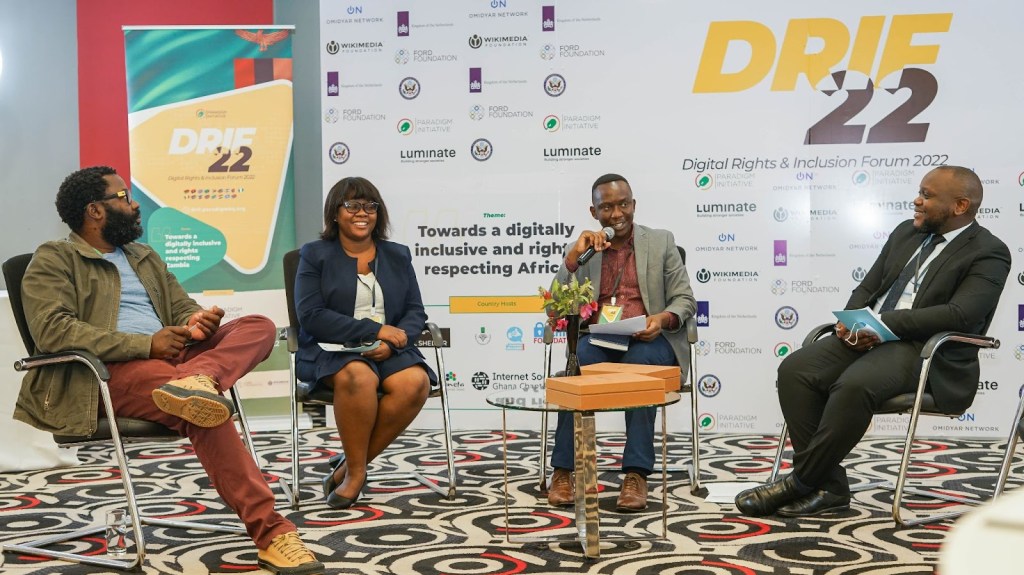
This year, for the first time ever, the Wikimedia Foundation’s Global Advocacy and Public Policy team sponsored the Digital Rights and Inclusion Forum (DRIF). The forum is hosted by the Paradigm Initiative, and aims to bring together digital rights activists and scholars from across Africa to work towards a digitally inclusive and rights respecting future for the continent.
Supporting DRIF is part of our team’s support for events for digital rights activists, who advocate for policy frameworks and regulations that promote human rights on the internet. It is also a way to promote knowledge equity and expand participation in knowledge creation and sharing in the region. Through our sponsorship of DRIF, the Foundation covered internet access costs for a number of registered attendees participating in online events, ensuring that there could be greater access to and participation in the Forum among African civil society groups and individuals. DRIF is a mixture of both in-person and online events and sessions that run from mid-April to mid-May 2022.
We connected with one of the DRIF organizers, Thobekile Matimbe from Paradigm Initiative, to learn more about what impact the event has made for digital rights discussions, coalition engagements, and advocacy work across the continent.
Q: Can you please tell us who you are, and what you do at the Paradigm Initiative?
My name is Thobekile Matimbe. I am a Community Manager at Paradigm Initiative (PIN). I have worked at PIN for almost 2 years now, and coordinate the Digital Rights and Inclusion Forum (DRIF) as well as manage our coalition engagements and advocacy work.
Q: What is your most recent experience with Wikimedia?
Our collaboration with Wikimedia in hosting DRIF22, which has been extraordinary as it enabled over 350 additional attendees to join the Forum with the necessary data support (editor’s note: this support focused on data packages for connectivity) that the Foundation provided.
Q: What is your event’s focus?
The 9th edition of DRIF focused on digital inclusion and digital rights under the theme, “Towards a digitally inclusive and rights-respecting Africa.” The online event held from 12–14 April had over 500 attendees who engaged with diverse topics such as women’s rights online, digital inclusion for persons with disabilities, and online media freedoms, to name a few. DRIF was also held in person in 17 African countries.
Q: What outcomes in terms of digital policy or partnerships do you hope will be sparked as a result of this conference?
We hope that the African states can craft better policies and laws, which promote digital inclusion and review the current normative standards to ensure compliance with international standards. In addition, one of the key outcomes of hosting DRIF is to provide an important strategy for engaging all relevant stakeholders, including the private sector, in shaping internet freedom in Africa. As PIN, we hope attendees continue to raise awareness of the issues discussed in their respective countries, and will build on the networks that are forged during the Forum.
Q: What similarities and/or differences do you see between last year’s and this year’s conference?
Last year we were not able to offer data support to attendees. In total, DRIF21 reached 445 attendees. This year, through the Wikimedia support, we were able to involve more people and the bar was raised! Over 500 attendees joined DRIF22, of which 372 benefited from Wikimedia’s data support.
Q: How do you see Wikimedia fitting into the conversations and topics that were aired at the conference this year and, more broadly, in the digital rights space across Africa?
Wikimedia has a part to play in raising awareness on digital rights issues and supporting activities that promote digital inclusion in Africa. More support is welcome in the future to ensure that platforms like DRIF reach an even wider audience, not only at virtual sessions, but also at in-person convenings in different countries. One of the topics discussed this year had to do with how African languages can have a meaningful space on the internet. Looking at Wikipedia, this is an area of ongoing development and engagement where it is possible to ensure African languages are given more visibility online.
Q: What other Paradigm Initiative projects are keeping you busy in your digital rights work?
We have our Digital Rights Media Fellowship programs planned for the year. Through these fellowships we hope to reach the media to enhance their awareness and reporting of digital rights issues. We recently had the launch of our annual report on the state of digital rights and inclusion in Africa, “Londa,” which covers 22 African countries (a title of Zulu origin calling for action to protect or defend). The launch took place at our DRIF22 closing Media Parley on 20 May 2022 in Nairobi, Kenya. We are also looking forward to releasing a short film, which will capture the key findings of the report.
Apart from this, we are conducting advocacy initiatives in Africa, engaging at the national level with governments and the private sector on the findings of our annual report, and also making representations to the African Commission on Human and Peoples’ Rights at relevant ordinary sessions, among other projects.
If you are interested in learning more about these and similar events, follow the Global Advocacy and Public Policy team on Twitter to stay up-to-date on public policy issues that affect free knowledge.

Can you help us translate this article?
In order for this article to reach as many people as possible we would like your help. Can you translate this article to get the message out?
Start translation